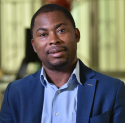NEF Fellow

Peter Ngene
Country:Nigiera
Area of Research:Nanomaterials/Nanotechnology
Institution:Utrecht University
Peter is working to develop novel energy storage materials that will enable an energy revolution. This includes nanomaterials for efficient production of hydrogen from renewable sources, and its storage so that hydrogen (in combination with fuel cells) can be used as an energy carrier for vehicles and stationary applications.
Peter was born in Enugu, South East Nigeria. His interest in science started in elementary school because of a tutor who showed him how science and technology had changed the world. His interest was then fostered by his high school physics teacher who mentored him. From this mentorship, he was sure he wanted to be a scientist and focused his courses in subjects like physics, chemistry and mathematics. After secondary school, he went on to study Chemical Engineering at the Federal University of Technology Owerri (FUTO), Nigeria, where he graduated in 2002. After his bachelor’s degree, he worked for two years as a Process Engineer in Dangote Sugar Refinery to gain some practical experience.
During this period, he was fascinated by the emerging field of nanotechnology and its potential to revolutionize almost every aspect of our life. Based on this, he enrolled in a dual master in Microsystems (MEMS) and Nanotechnology in 2006. The master’s degree program was jointly offered by ESIEE (École Supérieure d’Ingénieurs en Électrotechnique et Électronique) in Paris and Nanyang Technological
University (NTU) in Singapore. This was a turning point for his scientific career because it gave him the opportunity to be engaged in cutting edge research in the areas of nanomaterials, especially their application in renewable energy (energy storage). After graduating in 2007, he got a PhD position in the group of Prof. Krijn de Jong and Prof. Petra de Jongh at Utrecht University, the Netherlands, completing his PhD in 2012. After his PhD, Peter was a Postdoctoral Research Fellow for 3 years in the Materials for Energy Conversion and Storage (MECS) group, Department of Chemical Engineering, Delft University of Technology in the Netherlands. There, he continued to work on nanostructured materials for energy applications and sensing.
In 2015, he returned to Utrecht University where he is currently an Assistant Professor in the Inorganic Chemistry and Catalysis
group, Debye Institute for Nanomaterials Science. In a nutshell, Peter’s goal is to develop new materials that will enable the widespread use of energy from renewable and sustainable sources such as wind and solar. The major problem with these energy sources is that they are intermittent, therefore requiring some form of storage. Peter and his team are investigating several options to overcome this challenge. For example, he is developing novel materials that will enable energy to be stored efficiently via hydrogen or ammonia, materials for next generation rechargeable batteries for long driving range electric vehicles, heat storage and catalysts for energy conversion processes.
His work has had a high impact in the field of energy storage using metal hydrides. For example, Peter developed a strategy which is now widely used to make complex hydride nanocomposite materials for reversible hydrogen storage applications and solid-state
electrolytes for rechargeable batteries. He was the first to demonstrate that the kinetics of hydrogen release from complex hydrides can be improved significantly by co-confinement with catalysts in nanopores of carbon. He also developed inexpensive eye-readable hydrogen sensors for the diagnosis of lactose intolerance via hydrogen breath test.
He has published 28 peer reviewed articles, including in high impact journals like Angewandte Chemie, Energy and Environmental Science, Nano Energy, Advanced Functional Materials etc., with high number of citations. He was the Chair of the renowned Gordon Research Seminar on Metal-Hydrogen Systems in 2013, and was the recipient of the prestigious KNCV (Royal Dutch Chemical Society) prize for the best PhD thesis in 2012/2013.
